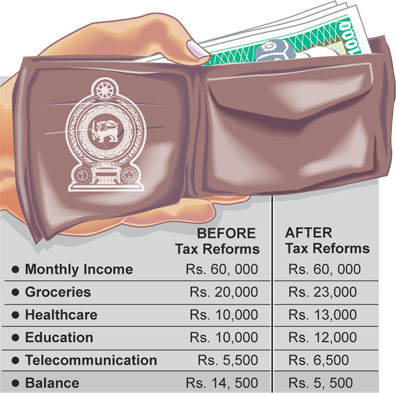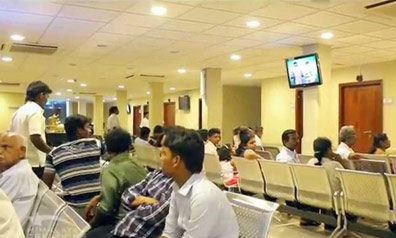Confusion reigns: VAT sits on the mat
by Rukshana Rizwie and Isuri Kaviratne
The increase in Value Added Tax (VAT) from 11% to 15% which was
scheduled to be implemented on May 2 cannot take effect because tax
reforms need to be sanctioned by a vote in Parliament and gazetted,
officials at the Inland Revenue Department told the Sunday Observer.
 |
|
Telecom service providers
still clueless over how the increase in VAT will affect services |
“The specific sectors which are to be taxed starting this week is
still a grey area even for officials at the Inland Revenue Department (IRD),”
a senior official at the IRD who did not wish to be identified, said.
“There has been no clear decision over the country’s fiscal policy ,so
the confusion among the general public is to be expected.”
Last week, the Ministry of Finance rolled out an ambitious overhaul
of the country’s indirect taxation system.
Amendments were made to the VAT which was raised from 11% to 15%
starting from May 2. A notice advising the public and businesses, of the
increase was published in newspapers on Wednesday (4) , though it is not
clear when the tax increase will be implemented.
The confusion regarding the government’s principal source of revenue
has raised concerns from several stakeholders.
“I agree there has been some confusion regarding the specific sectors
which are now liable to pay VAT, but as with every other budget this
country has passed, the changes in VAT and Nation Building Tax (NBT)
will be implemented and adopted accordingly,” the Deputy Secretary to
the Treasury, S.R. Attygalle told the Sunday Observer.
“The newspaper notice is in accordance with parliamentary approval
and comes into effect on the prescribed date.
Confusion
In the past once the budget has been passed, the changes would
ordinarily come into effect from the beginning of the financial year.”
Attygalle added that the increase in taxes have been mired in confusion
primarily due to the many changes and contradictory remarks that have
been made. “I understand the reason why consumers are concerned or
confused, but it need not be the case.
 The
IRD has posted the changes in VAT and NBT and its in the public domain,”
he said. The
IRD has posted the changes in VAT and NBT and its in the public domain,”
he said.
Many previously exempted sectors are now liable to pay the 15% VAT.
This includes the supply of telecommunication and healthcare services
which were previously exempted.
The other sectors include, the supply of telecom equipment or
machinery including copper cables, issuance of licence to local telecom
operators by the Telecommunication Regulatory Commission, and supply of
goods and services to projects other than housing projects. Finance
Minister Ravi Karunanayake announced that bread, wheat flour, milk,
spices, pharmaceuticals, electricity, public transport, and private
education would be exempted.
“We are aware that healthcare services are exempted but we’ve been
asked by private hospitals whether they should tax the meals provided
for the in-patients,” said Senior Deputy Commissioner General of Tax
Policy at the IRD M.G. Somachandra.
Some sections of business have threatened to take the matter of VAT
and its implementation to court.
The increase in Value Added Tax (VAT) on a range of goods and
services will affect several sectors of the economy including retail
trade, vehicles, hospitality, private healthcare and private education.
The Sunday Observer spoke to a range of people from sectors said to
be impacted by VAT increases to get their opinion on how the rising tax
burden would affect their businesses.
Price of bread stays same
The price of bakery products except for bread is to increase by Rs.10
from May 2nd due to the increase in VAT from 11% to 15%, the All Ceylon
Bakery Owners’ Association Chairman N.K. Jayewardene told the Sunday
Observer.
“Except for locally produced flour, the increase in VAT on all
ingredients will result in the price of bakery items rising in the range
of Rs.5 to Rs.10,” he said. He explained that many of the ingredients
are imported and hence the combination of the VAT increase and a weak
Sri Lankan rupee will likely cause more price increases.
He said that the All Ceylon Bakery Owners’ Association met earlier
this week and decided collectively not to increase the price of bread.
This year the price of bread has already been increased twice. The price
of a loaf of 450g bread was increased by Rs.1 to be Rs. 55 due to the
increase in the NBT imposed by the budget.
In March this year it was increased by another Rs.4 due to a global
increase in wheat and flour prices. The price of a standard loaf of
bread now stands at Rs. 58.
Private Hospitals
|

Private sector hospital charges are expected to rise following
the VAT increase |
Wijay Ransi, Secretary of the Association of Private Hospitals and
Nursing Homes told the Sunday Observer, the implementation of the
proposed VAT will directly affect hospital services charges.
According to the new tax reforms, the charges for hospital services
will be increased by 15% but the prices of medicine is to remain
unchanged.
Ransi said the private hospitals, along with the doctors, already
have mechanisms to make their services at concessionary rates to people
with lower incomes.
“Doctors cancel their charges and deduct lab charges from the total
bill, but if the VAT is increased, this becomes counterproductive,” he
said.
The Association predicted a drop in patients as a result of the new
taxes, with those struggling to afford private care turning to the state
medical system, thus driving up the cost of healthcare borne by the
government.
Telecom
Chief Operating Officer of Mobitel, Nalin Perera said the increase in
the telecommunication bill will be negligible after the tax reforms, as
it will not have a significant impact.
An official at another of Sri Lanka’s large telecommunications
service providers told the Sunday Observer that the company was
‘clueless’ over how the increase in VAT was to affect telecommunication
services.
“Despite a notice by the Treasury that VAT would be increased to 15%
it is still a grey area for telecoms that are scrambling to make sense
of this directive,” he said. “We are still waiting for word on how the
payment structures will need to be changed.” |

